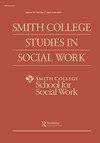Editorial –Forging a New Chapter: Message from the New Editor-In-Chief
IF 0.9
Q2 SOCIAL WORK
引用次数: 0
Abstract
It is my great privilege to be writing my first editorial for Smith College Studies in Social Work (“Smith Studies”) as the journal’s new Editor-in-Chief. I would like to express much gratitude to the outgoing co-editors, Drs. Marianne Yoshioka and Marsha Pruett. Under their leadership, Smith Studies, previously known as a journal with a psychoanalytic/psychodynamic orientation, has expanded its scope and aims and become a forum for a wider range of theoretical and empirical knowledge and practice of clinical social work. It is impossible to write about Smith Studies without considering its relationship with Smith College School for Social Work (SSW). As the oldest clinical social work program in the country, Smith Psychiatric Training School was established in 1918 to help treat trauma among World War I veterans. Smith SSW has been since leading the discipline of clinical social work and remains today as a premier graduate school of social work with a sole focus on clinical practice education. Launched as one of the first social work journals in 1930, Smith Studies has served as a scholarly home not only for Smith SSW faculty but also other practitioners and scholars in a wider social work arena. The journal has published a number of historically prominent, seminal articles that shaped the theory and practice of clinical social work for nearly a century. Published on a range of topics from therapeutic relationship, transference and countertransference, the role of culture, clinical supervision to social and policy contexts that impact clinical practice, Smith Studies has long played a significant role in the clinical social work communities. More recently, the journal has led important dialogs about the intersection between theory, research, and practice, articulating and examining elements of culturally relevant, theoretically and empirically grounded clinical practice. So, what is next for Smith Studies? I am deeply honored and humbled to take on the role of the editor-in-chief to further the journal’s mission, which is to advance and transform knowledge and practice of clinical social work in times of unrest and uncertainty. This new appointment comes in such a critical time for the profession of social work. The racial unrest and reckoning during the last few years precipitated an important movement in social work, in which our leaders have come to terms with and apologized for social work’s problematic (historical and ongoing) involvement with racist and colonial projects. From cultural genocide of Indigenous people, internment of Japanese Americans during World War II, to racist child protection practice, we as a profession are in an early phase of SMITH COLLEGE STUDIES IN SOCIAL WORK 2023, VOL. 93, NO. 1, 1–4 https://doi.org/10.1080/00377317.2023.2217738社论-谱写新篇章:新任总编辑寄语
作为该杂志的新任主编,我很荣幸能为《史密斯学院社会工作研究》(“史密斯研究”)撰写我的第一篇社论。我非常感谢即将离任的联合编辑Marianne Yoshioka博士和Marsha Pruett博士。在他们的领导下,《史密斯研究》(Smith Studies),以前被称为一本以精神分析/心理动力学为导向的期刊,已经扩大了其范围和目标,并成为一个论坛,提供更广泛的临床社会工作理论和实证知识与实践。写史密斯研究不可能不考虑它与史密斯学院社会工作学院(SSW)的关系。作为美国历史最悠久的临床社会工作项目,史密斯精神病培训学校成立于1918年,旨在帮助治疗一战老兵的创伤。自那以后,Smith SSW一直领导临床社会工作学科,至今仍是一所一流的社会工作研究生院,专注于临床实践教育。《史密斯研究》于1930年作为首批社会工作期刊之一创刊,不仅为史密斯社会工作学院的教职员工,也为更广泛的社会工作领域的其他从业者和学者提供了学术家园。该杂志发表了许多具有历史意义的开创性文章,塑造了近一个世纪以来临床社会工作的理论和实践。史密斯研究发表了一系列主题,从治疗关系、转移和反转移、文化的作用、临床监督到影响临床实践的社会和政策背景,长期以来在临床社会工作社区中发挥了重要作用。最近,该杂志领导了关于理论、研究和实践之间交叉点的重要对话,阐述和审查了与文化相关的、基于理论和经验的临床实践的要素。那么,史密斯研究的下一步是什么呢?我非常荣幸和谦卑地担任主编,以推进该杂志的使命,即在动荡和不确定的时代推进和转变临床社会工作的知识和实践。这项新任命是在社会工作行业的关键时刻做出的。过去几年的种族骚乱和清算引发了社会工作的一场重要运动,在这场运动中,我们的领导人已经接受了社会工作有问题(历史上和正在进行的)参与种族主义和殖民项目,并为此道歉。从对土著人民的文化种族灭绝、二战期间对日裔美国人的拘留,到种族主义的儿童保护做法,作为一个职业,我们正处于史密斯学院社会工作研究2023的早期阶段,第93卷,第1期,第1-4期https://doi.org/10.1080/00377317.2023.2217738
本文章由计算机程序翻译,如有差异,请以英文原文为准。
求助全文
约1分钟内获得全文
求助全文
来源期刊

SMITH COLLEGE STUDIES IN SOCIAL WORK
SOCIAL WORK-
CiteScore
1.50
自引率
10.00%
发文量
10
期刊介绍:
Smith College Studies in Social Work focuses on the vital issues facing practitioners today, featuring only those articles that advance theoretical understanding of psychological and social functioning, present clinically relevant research findings, and promote excellence in clinical practice. This refereed journal addresses issues of mental health, therapeutic process, trauma and recovery, psychopathology, racial and cultural diversity, culturally responsive clinical practice, intersubjectivity, the influence of postmodern theory on clinical practice, community based practice, and clinical services for specific populations of psychologically and socially vulnerable clients.
 求助内容:
求助内容: 应助结果提醒方式:
应助结果提醒方式:


